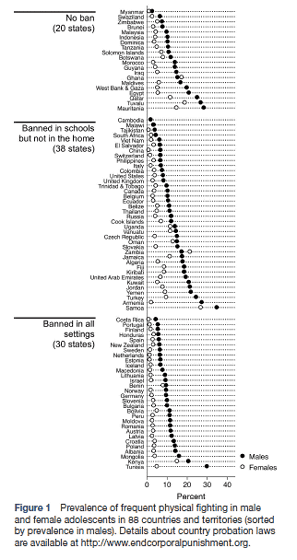A dramatic reduction in the violence of young people by prohibiting 'corporal punishment' is shown in a study investigating 400,000 people in 88 countries

By David Dav
A view on corporal punishment that gives punishment such as hitting opponents by saying "disciplining" is increasingly severe, and the view that " corporal punishment is mere violence " is intensifying. Meanwhile, the idea of "necessary evil" is also persistent corporal punishment, but from the survey targeting 400,000 people in 88 countries, the result of "the violence of young people decreases by prohibiting corporal punishment" Has been revealed.
National bans on slapping children linked to less youth violence | BMJ Open
https://blogs.bmj.com/bmjopen/2018/10/15/national-bans-on-slapping-children-linked-to-less-youth-violence/
Countries that ban spanking have kids who are less violent
https://www.usatoday.com/story/life/allthemoms/2018/10/29/countries-ban-spanking-have-kids-who-less-violent/1809639002/
This survey was published at the British Medical Association magazine "BMJ Open". By classifying 88 countries throughout the world into three patterns "full ban on corporal punishment including schools and homes", "prohibition of corporal punishment in schools", "no prohibition of corporal punishment" and comparing it with the violence of young people in their respective countries , The relationship between corporal punishment and violence was investigated.
As a result, 69% of males and 42% of females were less likely to cause disputes physically in countries that completely banned corporal punishment such as Germany, Spain, Brazil, etc. It is clear that it is clear. Also, in countries where corporal punishment is forbidden only at school, men have not changed remarkably, while women show 56% lower value. This "partial prohibited" country includes USA, UK, Canada and others.
The table below summarizes the results. From the top, it is classified as "no prohibition", "prohibited in school" and "completely prohibited", with black dots as men and white dots as women. Countries are sorted by male values. Looking at the overall tendency, while there are many black points in the "no prohibition" group overall, in the "prohibited in school" and "completely prohibited" group, the tendency that black dots are gathered to the left side, The proportion of young people who cause violent incidents is low.

About this result, the lead researcher and Associate Professor Frank Elgar of McGill University in Montreal said "At the moment, young people grown in countries prohibiting corporal punishment are more violent than young people in other countries It is low. "
Moreover, it is confirmed that this tendency is not related to the difference of wealthiness and homicide rate by each country. In other words, the violence of young people in that country will be influenced to a certain extent depending on whether there is an environment in which the child is in the growing season for corporal punishment. It is also clear that children who are subject to corporal punishment think that "they are unwanted people" and that children who have received corporal punishment imitate adults and also self-discipline "discipline" by corporal punishment It is.
Related Posts:
in Note, Posted by darkhorse_log







